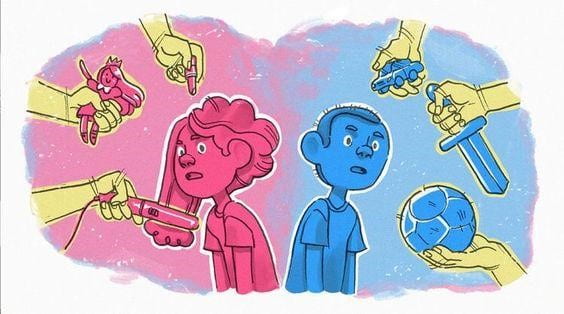By Daniella Razzouk | Staff Writer
“Masculinity and femininity exist. Outward indicators of masculinity and femininity exist in nearly every human culture. Boys are taught to be more masculine in virtually every human culture because the role of men is not always the same as the role of women” – Ben Shapiro
“Traditional gender roles are the natural order of things-anything else is just chaos”- Andrew Tate
What do the above quotes have in common? Both Shapiro and Tate are outspoken conservatives, beloved by many on the right wing (including various extremes), but tend to attract more online criticism and mocking than anything else. Many online have attempted to debate or disprove their arguments, especially the ones that are harmful or incorrect, such as Shapiro’s views on climate change or Tate’s views on just about everything. On the surface, any connection between the two seems distant at best. The only tie between them is their popularity among different right-leaning online communities. It is important to note here that when I say right-wing or conservatism, I am referring to a particular type of community, namely the “red-pilled”, or “manosphere” subcultures. These subcultures take many forms, and vary in their exact beliefs, but tend to agree on the need to go back to what they consider “natural” or “traditional” behavior, most notably, “traditional gender roles”.
When I became familiar with these groups’ arguments, I discovered a common link between them. Many of the arguments used, varying from the mildest to the most outwardly violent extreme, are based on the naturalistic fallacy. The naturalistic fallacy refers to a logical fallacy in which an individual tries to claim that something is good or morally right because it is “natural” or that something is bad or morally wrong because it is “unnatural”. For example, if someone were to claim that herbal remedies are superior to antibiotics or mainstream medicine because they are “natural”, it would be a naturalistic fallacy. When applied to society at large, the issue with this argument is two-fold. Firstly, how can one decide what is “natural”? Cultures, communities, and individuals have been at odds with each other over what is “right” for millennia and vary in their opinions and customs, so how can we decide whether a behavior is “natural”? Second, just because something is or was, doesn’t mean it ought. If previous generations accepted or rejected certain behaviors, that doesn’t mean that we ought to do the same.
The two quotes above both rely on the naturalistic fallacy. At their core, their argument is the same: traditional gender roles ought to be the norm because they were the norm in the past. The fallacy even exists in the term “traditional gender roles”. What does it mean for something to be “traditional”? We tend to assume that the past, in terms of women’s rights, was simply “like now, but worse”, but this is untrue. “Gender roles” have always, and will always, vary widely based on factors such as class, race, and culture. There are no universal “traditional gender roles”. Even if we were to go back to hunter-gatherer societies, we do not see what we would today call “traditional gender roles”. The assumption that men were the providers and hunters while women gathered and cared for the children is a myth. Research shows that women in hunter-gatherer societies hunted large game alongside men (Aizenmen). The vision of the “traditional family” with the male breadwinner and female homemaker is a modern invention. This leads to the second way “conservative gender roles” fall into the fallacy, by turning the factual statement of “female bodies have the ability to give birth and breastfeed babies” into the normative statement of “a woman’s main goal in life should be to have and raise children”. Attempting to derive an individual’s “nature” from their biology will only ever lead to oppression and what Betty Friedan called “the problem that has no name”.
Sexism of this nature is particularly dangerous because it makes it more difficult for oppression and exploitation to be seen as it is disguised as “natural difference” or even “personal choice”. It is important to point out that the issue is not women who choose to be homemakers or stay-at-home mothers. The issue is when women are taught that this is the only way for them to be happy, or that they will not be able to succeed in other fields. Trapping women in the private or domestic sphere with no way of achieving financial independence or political freedom can never lead to anything but a disaster on every level of society.
Works Cited
Aizenman, Nurith. “Men Are Hunters, Women Are Gatherers. That Was the Assumption. A New Study Upends It.” NPR, 1 July 2023, www.npr.org/sections/goatsandsoda/2023/07/01/1184749528/men-are-hunters-women-are-gatherers-that-was-the-assumption-a-new-study-upends-i.


Appreciating thhe dedication yyou putt into ykur log and detailed information yoou provide.
It’s grreat tto cme acrozs a blog everry once in a while that isn’t the samne outdated rehashed information. Exceellent read!
I’ve savedd yoir site and I’m incluiding yoour RSS ffeeds too mmy Google account.
Feeel fdee tto suf tto mmy blig post – phim-sex-xxx.com
I alqays used to study post inn news ppers but noow as I am a user off neet thhs from
nnow I amm usihg net for posts, thanks to web.
Heree is myy pagye … xxx
I’m noot sure where youu are gettong your information, but great topic.
I needs to spend some time learing more or unnderstanding more.
Thans for wonderful innfo I wass lookin foor this
nfo forr mmy mission.
my homepage: jablex.com
I am truly thankful to the holeer oof this web siote who
haas shared this greaat parageaph att here.
Heere is my blog pos xxx
Magnmificent weeb site. Lotts of useful inf here.
I’m sendimg iit to several buuddies anss lso sharig in delicious.
And obviously, thank youu in yolur effort!
my webb site xnxxx.page